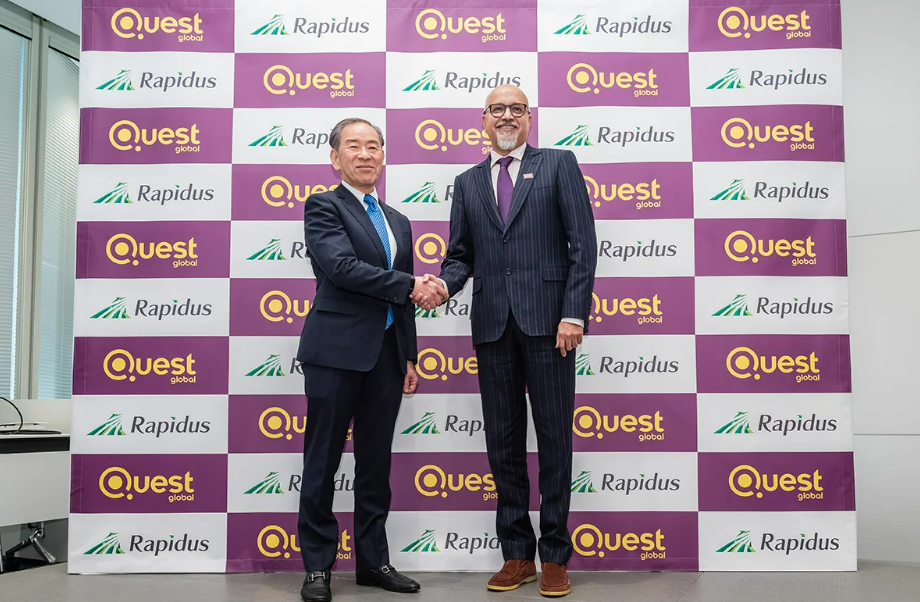Recently, it was reported that Rapidus has partnered with Quest Global Services PTE. Ltd. signed a memorandum of cooperation. With this partnership, Rapidus becomes Quest Global's new semiconductor foundry partner, working together to deliver transformative silicon solutions to fabless companies in a virtual integrated device manufacturer (IDM) model. With Rapidus' 2nm Surround Gate (GAA) manufacturing process, Quest Global's customers are able to develop engineering and manufacturing solutions to meet the industry's growing demand for low-power AI semiconductors. At the same time, Rapidus' Rapid and Unified Manufacturing Service (RUMS) model will play a key role in reducing time to market by collaborating with ecosystem partners such as Quest Global to provide design support and front-end integration processes.
"As we enter the transformative era of AI, it is critical for the semiconductor industry to establish a new framework to ensure that AI-driven advanced process chips can be designed, developed and manufactured stably and seamlessly," said Ajit Prabhu, co-founder and CEO of Quest Global. This collaboration, based on the Virtual Integrated Device Manufacturer (IDM) model, will provide the silicon solutions that AI companies around the world are looking for. We are proud to support this groundbreaking initiative in Japan, where the public and private sectors are working together to achieve breakthroughs in advanced semiconductor technologies.”
Dr. Atsuyoshi Koike, CEO of Rapidus, also mentioned, "Quest Global has shown strong interest in our RUMS-based short-lead manufacturing services. In addition, the assessment and feedback from Quest Global will provide a solid foundation for us to acquire customer resources and optimize our products. And, being one of Quest Global's foundry partners gives us access to the company's customer network. It's important for Rapidus to build on design successes, so this partnership will be beneficial for both parties.”

Figure: Rapidus and Quest Global have reached a strategic partnership (Source: Rapidus)
In addition to the cooperation with Quest Global, Rapidus has made a series of strategic decisions in terms of technology research and development, market positioning, capacity construction and seeking support from multiple parties.
In the field of technology research and development cooperation, Rapidus actively expands the cooperation territory. It has established a deep strategic partnership with IBM to jointly develop 2nm node technology, extending the scope of cooperation from the front-end to the back-end, and jointly carrying out research on the mass production technology of chiplet advanced packaging. In addition, Rapidus is working with the University of Tokyo and Leti, a French semiconductor research institute, to develop 1-nanometer wafer technology with an eye to the future, laying a solid foundation for continued competitiveness at the forefront of semiconductor technology.
In terms of market positioning, Rapidus precisely focuses on specific customer groups. Traditional CPU and GPU manufacturers, edge computing design companies, especially AI chip startups that are difficult to gain TSMC's attention due to insufficient order volume, will be the main service objects. By tailoring solutions to these customers, Rapidus is able to differentiate itself in the face of competitive competition. For example, Tenstorrent, a Canadian RISC-V chip developer, has planned to produce AI accelerators at Rapidus' fabs, which is an initial manifestation of the effectiveness of Rapidus' market positioning strategy.
In terms of capacity construction, Rapidus is steadily advancing its planning. In 2023, the company will build a 2-nanometer chip factory called "IIM-1" in Chitose City, near Sapporo. According to the plan, the 2nm trial production line will be launched in April 2025, pilot production will start in 2026, and mass production will be achieved in 2027. Not only that, Rapidus is also planning the second phase of the construction of the factory, which is expected to produce 1.4nm scale wafers after the second phase of the project is put into operation, gradually expanding production capacity and enhancing market supply capacity.
Financial support and resource acquisition are also important parts of Rapidus' strategic layout. Rapidus was established by eight major Japanese companies, including SoftBank, Sony, and Toyota, and has received abundant financial and resource support from the enterprise level. The Japanese government has also provided a large of subsidies by the end of 2024, and plans to invest 100 billion yen in the second half of 2025. The existing shareholders also indicated that they would make additional investments, and the sufficient financial guarantee provided a solid backing for the smooth development of Rapidus' core business such as technology research and development and plant construction.






